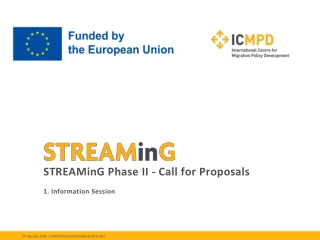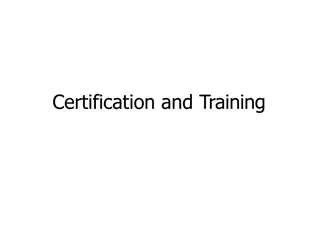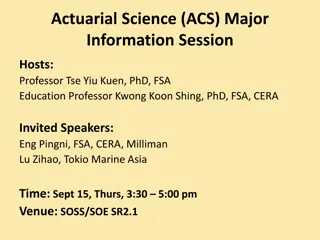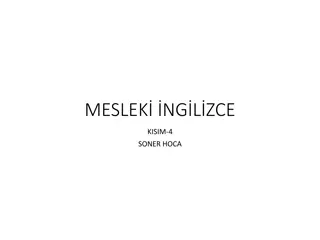Professional Organizations and the CRPO Information Session
Professional organizations like AAMFT, CAMFT, and OAMFT play a crucial role in protecting providers, offering services, and providing training at better rates for Marriage and Family Therapists and healthcare providers. The American Association for Marriage and Family Therapy (AAMFT) is a prominent organization known for its unified voice internationally, making it the preferred choice for those planning to work in the US or internationally. Membership categories include Student, Pre-Clinical Fellow, and Clinical Fellow, with different requirements for each. Tyndale, although not accredited by COAMFTE, is accepted by the institution and has specific requirements for graduates interested in the evaluative track. Curriculum requirements are essential, emphasizing the need for AAMFT-approved courses and documentation.
Download Presentation

Please find below an Image/Link to download the presentation.
The content on the website is provided AS IS for your information and personal use only. It may not be sold, licensed, or shared on other websites without obtaining consent from the author. Download presentation by click this link. If you encounter any issues during the download, it is possible that the publisher has removed the file from their server.
E N D
Presentation Transcript
Professional Organizations and the CRPO Information Session
This presentation can be found at: http://www.tyndale.ca/seminary/counselling/downloads/documents
Professional Organizations AAMFT, CAMFT, and the OAMFT are all professional organizations instituted to protect the provider and offer services and training at better rates, and present a united voice for Marriage and Family Therapists and other health care providers. There are others, some of which may be found in the Professional Association Handbook found on the counselling downloads website. Currently the OAMFT and AAMFT are associated, and the CAMFT is a more recent development in the Canadian context. The standards of the AAMFT relate to the other two organizations and therefore the AAMFT will be addressed first.
American Association for Marriage and Family Therapy (AAMFT) Developed in the US and provides a unified voice for many marriage and family therapists and is somewhat known internationally. Best choice for those who plan to work in the US or internationally or who want membership in the OAMFT (Ontario Association for Marriage and Family Therapy)
Membership Categories Student Pre-Clinical Fellow Clinical Fellow
Clinical Fellow Membership Evaluative Clinical Fellow Membership Evaluative Requirements Requirements Educational Requirements: Master or doctorate degree from an educational institution accredited by the Commission on Accreditation for Marriage and Family Therapy Education (COAMFTE). Or a master s or doctoral degree in a related mental health field and substantially equivalent course of study from a regionally accredited educational institution or post-graduate training institute accepted by COAMFTE.
Tyndale is not accredited by the Commission on Accreditation for Marriage and Family Therapy Education (COAMFTE) Tyndale is a regionally accredited educational institution accepted by COAMFTE. Tyndale graduates must apply under the evaluative track Each course must be approved and categorized by AAMFT Keep a permanent copy of every syllabus of every counselling course Keep a copy of all AAMFT correspondence
Curriculum Requirements Curriculum Requirements Marriage and Family Studies (a minimum of 3 courses required) 1. Family Systems Theory 2. Cross-Cultural Perspectives in Marriage and Family Therapy 3. Gender and Socioeconomic Perspectives in Marriage & Family Therapy
Marriage and Family Therapy (a minimum of three courses required) 1. Theories and Methods of Family Therapy 1 2. Theories and Methods of Family Therapy 2 3. (need one elective) Currently Couples Therapy, Emotionally Focused Therapy, and (rarely) Child and Adolescent Therapy have been accepted in this category.
Human Development (a minimum of three courses required) 1. Personality Theory 2. Current Issues in Psychopathology 3. (need one elective) Electives that could qualify: Human Development and Learning; Human Sexuality; Child and Adolescent therapy; Therapeutic and Systemic Approaches to Addictions
Professional Ethics (a minimum of one course required) 1. Professional Ethics Research (a minimum of one course required) 1. Research Methods Total: 11 courses
Practicum Requirement Minimum one (1) year, supervised Clinical Fellow practicum (internship), with 300 hours of direct client contact with individuals, couples, and families.
Post Graduation Requirements Post Graduation Requirements Minimum of two (2) years of professional work experience in marriage and family therapy following receipt of master s or doctorate degree. Individuals must complete a 1000 additional hours of direct client contact hours with a minimum of 200 hours of supervision concurrently.
Post Graduation requirements: Post Graduation requirements: Tyndale s Internship only provides 150 face-to-face counselling hours The other 150 hours can be accomplished after graduation and must be supervised by an AAMFT approved supervisor after graduation. Once the total of 300 face-to-face Internship hours has been completed, one may begin to log the required 1000 post-graduation hours
Steps to take: Once accepted into the Counselling Major one can apply for AAMFT student membership at any time Typically around the end of first year is a good time to apply Application can be done on-line Once you become a member, keep your membership active
Advantages of membership: Pre-approval of courses within the categories Post-degree applications will be simpler if you have updated your file regularly
Tyndale Courses Not all Tyndale Counselling courses are accepted by AAMFT. http://tyndale.ca/seminary/counselling/downloads/documents: AAMFT Clinical Membership Evaluative Track This file has a list of all of the courses that AAMFT has accepted in the past and the categories in which they are typically placed
AAMFT Contact Person The current AAMFT contact person for students seeking to have courses pre-approved is Dorothy Bose: Dbose@aamft.org Turn-around time for requests to categorize courses is often two months
Our Canadian History: AAMFT, the professional organization that provided the most credibility in the past for therapists practicing at the Masters level. Requirements are set at appropriate standards including training, and supervised internships. With the advent of Provincial licensing, credibility is provided now by the College of Registered Psychotherapists, whose standards are, in fact, very similar to those of AAMFT.
AAMFT suspended all local divisions several years ago which has left Canada in a position to consider other options OAMFT, a former division of AAMFT has changed its relationship to AAMFT and is still somewhat connected and operating for Canadian therapists. CAMFT has evolved as a new organization, similar to AAMFT but Canadian, with a Canadian understanding of the needs of therapists in this country.
AAMFT Advantages and Disadvantages AAMFT Advantages and Disadvantages Well known organization in US and somewhat internationally and credible Provides some services even in Canada Services to membership have been slower and not necessarily Canadian friendly
CAMFT Canadian Association of Marriage and Family Therapists: Evolved after AAMFT suspended all local divisions several years ago Legally holds the title for RMFT s CAMFT has recently set standards for membership very similar to AAMFT and has become the Canadian answer to AAMFT
Course work has the same categories as AAMFT Easier to work with for our institution and delivers better service Requires additional study of the Canadian issue of Residential Schools and the Truth and Reconciliation document.
The degree must include a supervised practicum (supervised client contact hours with individuals, couples, and families). A minimum of 150 supervised client contact hours is required. Applicants who did not complete the full 150 hours practicum during their graduate program may document the remaining hours with initial post graduate client contact hours supervised by an CAMFT Approved Supervisor, Supervisor in Training, or by an alternate supervisor pre-approved by CAMFT specifically for that applicant.
After Graduation: Applicants must provide at least 1,000 hours of direct client contact in therapy with individuals, couples or families which is demonstrably systemic therapy And receive a minimum of 200 hours of supervision concurrently
In the case of programs whose practicum requirements meet or exceed 150 hours, there are two categories: Programs which are COAMFTE approved: all hours acquired within the program are counted toward the 1000 hours total required to become an RMFT. Programs which are not COAMFTE approved: the 150 practicum hours must be completed before beginning to acquire the 1000 hours required to become an RMFT
Two Categories in COMFTE: For programs approved by COAMFTE (Commission on Accreditation for Marriage and Family Therapy Education): 2 levels of schools in this category, depending on amount of face to face completed in internship. A percentage of the acquired direct contact hours must be in relationship counselling with more than one client All hours acquired within the program are counted toward the 1000 hours total required to become an RMFT. Programs not COAMFTE approved (such as Tyndale) Must acquire 150 hours in practicum and/or post graduation before beginning to acquire the 1000 hours required. A percentage of these hours must be with multiple clients in the room (2 or more).
OAMFT Ontario Association for Marriage and Family Therapy An International Independent Affiliate of the AAMFT Three board members at Tyndale: Winnie Lai, Melissa Johari, Wilma Nevers
History In 2017, AAMFT had a major restructuring and changed its relationship with all its previous divisions (including OAMFT). The OAMFT (the Ontario Association for Marriage and Family Therapy) opted to be an International Independent Affiliate of AAMFT This relationship allows for more leadership autonomy within the OAMFT while keeping the close association with AAMFT
The OAMFT recognizes the specialized training in systems therapy and now offers the Certified Couple and Family Therapy (CCFT) certification to Clinical Fellows who are Ontario members Significantly, OAMFT is THE VOICE of marriage and family therapy in Ontario Represents MFTs on the collaborative group of therapy organizations that meet with and impact the CRPO
OAMFT provides services for members and opportunities that focus on advocacy, education, and networking within Ontario. To become a member of the OAMFT, you must register with the AAMFT and opt-in to International Independent Affiliate of Ontario to specify your member benefits. Membership requirements, then, are those of AAMFT.
As an OAMFT member you are eligible to receive the services, resources, and conveniences provided by the AAMFT. You are also eligible for additional benefits which include exclusive member discounts on products and services such as OAMFT courses, webinars, and the annual conference. These are very useful for PD credits for CRPO The annual registration fee is covered by the discounts accessed for services mentioned above.
Your Choices Your Choices Our Opinions: Our Opinions: CAMFT is currently in the process of accrediting various training institutions and has invited Tyndale and some 7 other Canadian Universities and Seminaries to participate in setting these standards. Tyndale has withdrawn from this group as a result of the rulings requiring accredited institutions to guarantee a percentage of the internship hours before graduation be with more than one client. Nevertheless, we believe that CAMFT is more reasonable and sensitive to Canadian needs than we have found AAMFT to be.
We believe the standards of CAMFT and OAMFT higher than other professional organizations available to graduates. AAMFT/OAMFT make more sense for those who may work internationally at some point. Both CAMFT and OAMFT are the professional organizations for those who wish to have a strong MFT component in their work.
Options: Options: Professional membership is not required, but it is wise Adds credibility and networking opportunities to new therapists Gives benefits such as cheaper professional liability insurance, etc. Opens doors to continuing educational opportunities. Other Professional Organizations: Please see the list provided in the counselling downloads under Professional Association Handbook
CRPO AAMFT/OAMFT/CAMFT are all professional organizations - membership is wise but not required for practice. Registration with the CRPO is required and unrelated to membership in a professional organization.
The College of Registered Psychotherapists of Ontario http://www.crpo.ca/
Controlled Act of Psychotherapy Controlled Act of Psychotherapy The controlled act of psychotherapy has been proclaimed and is one of 14 "controlled acts" or healthcare activities which are restricted to members of certain regulated professions.
The RHPA defines the controlled act of psychotherapy as follows: Treating, by means of psychotherapy technique, delivered through a therapeutic relationship, an individual s serious disorder of thought, cognition, mood, emotional regulation, perception or memory that may seriously impair the individual s judgment, insight, behaviour, communication or social functioning.
CRPO Registration Categories Qualifying Member Registered Member still under supervision Registered Member independent practice
Who is a regular applicant? Who is a regular applicant ? All applicants are regular applicants, except those already registered in another province or territory who are applying for registration in Ontario under labour mobility rules.
In general, regular applicants are individuals who have recently completed graduate-level psychotherapy programs: May be an independent psychotherapy program that requires an undergraduate degree for admission May be in a university master s programs.
Tyndales Mdiv Counselling Major Clinical Track has been recognized as an education and training program by the CRPO This permits students of that track to apply more easily to the CRPO without having to prove their competencies individually.
CRPO applicants must complete: their education and training program within one year immediately prior to application; or their clinical experience requirement within the one year immediately prior to application; or 750 currency hours within the three years immediately prior to application; or upgrading activities approved by Registration Committee.
Registration requirements for Registration requirements for regular applicants regular applicants In addition to meeting the educational requirements for all applicants, regular applicants must complete the following: The Professional Practice & Jurisprudence e-Learning Module
Qualifying Members: Virtually all regular applicants will spend a period of time as a Qualifying Member, i.e. RP (Qualifying), until they are deemed eligible to write the registration exam and have successfully completed it. To be eligible to write the exam, a Qualifying Member must have completed all education and training requirements for RP registration, but not necessarily all required direct client contact hours and clinical supervision hours.
Qualifying Members When all requirements have been completed, the RP (Qualifying) will move to full RP status. (completed the competencies exam and 450 direct contact hours with appropriate amount of supervision)
RP Qualifying Members: Individuals nearing completion of their education and training program can apply for registration as a Qualifying Member during the final semester/ segment of their program An RP (Qualifying) will be required to practice with clinical supervision and must be actively engaged in completing registration requirements to become registered as an RP.























